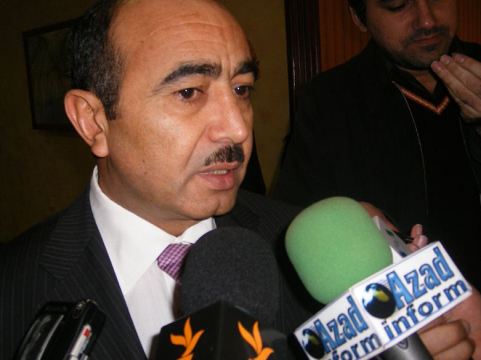Govt dismisses EC vice president's allegations

By Nigar Orujova
An Azerbaijani official has said European Commission Vice President Neelie Kroes and her spokesperson's statement about unauthorized use of their computers at a hotel in Baku is unfounded.
Kroes and her spokesperson visited Azerbaijan to attend the international Internet Governance Forum (IGF), which was held in the Azerbaijani capital November 6-9.
"Following the statement, we issued instructions to relevant agencies, including the hotel administration, where they were staying, to address the issue. Any interference with their computers is out of the question, and no evidence or facts confirming these statements have been revealed," Ali Hasanov, head of the Presidential Administration's social and political affairs, told the local press on Monday.
Hasanov said the allegations were aimed at harming the image of Azerbaijan and organizers of the event or to diminish their authority and sully their image.
"If Kroes and her assistant really believe that there was interference in their computers, then please let them apply to the Azerbaijani Prosecutor General's Office. A criminal case will be filed and investigation will be launched based on this appeal," he said.
European Commission Vice President Kroes at the IGF forum in Baku cited control over the Internet and online media in Azerbaijan and restrictions on their work.
Head of the foreign relations department at the Azerbaijani Presidential Administration, Novruz Mammadov, commented last week that Kroes is not informed about Azerbaijan and was visiting the country for the first time.
"I know that this is her first visit to Azerbaijan and she does not have any information about our country. If this were not so, she would not have asked a representative accompanying her why Nakhchivan has been isolated from Azerbaijan," Mammadov stressed.
"Azerbaijan has freedom of the Internet. The programs of Internet radio and Internet television, online newspapers and magazines, internal and external social networks are widespread. Thousands of bloggers blog freely in Azerbaijan's internet space," he said.
Mammadov added that the protection of human rights in Azerbaijan as in European countries is one of the important areas of activity of the modern Internet network.
"Developing Internet media, freedom of opinion and expression on the Internet, expanding social networks, ensuring an open and transparent activity of the government, citizens' engagement in management processes are the new opportunities provided by the global Internet network in Azerbaijan," he noted.
Mammadov noted that it is unclear how the European Commission vice president understands the responsibility, while speaking of fundamental rights.
"It seems that she is unaware of the occupation of Azerbaijan's territory [by Armenian forces] for over 20 years and more than one million people [who were displaced during the 1990s war] living in these areas, who have been deprived of these fundamental rights for many years," Mammadov said.
"Kroes certainly knows, having held her post for two years, that such biased, wrong statements hamper the development of the cooperation, rather than contribute to it," he said.
Azerbaijani Presidential Administration's political analysis and information provision department head Elnur Aslanov said the Internet Governance Forum, organized jointly by the UN and the Azerbaijani government, reaffirms the importance that the Azerbaijani state attaches to the Internet and its free use.
"Azerbaijan ranks high on Internet access compared to many countries -- 65 percent," he noted.
Aslanov underlined that unlike some Western countries, Azerbaijan spends available financial resources on projects aimed at social and economic development of the country, instead of tracking and getting information online through espionage.
According to Aslanov, free access to Internet sites and free expression of views by citizens on social networks has a significant impact on the relations between the state and citizens.
"We have always been against restrictions in the Internet and today we adhere to this position," Aslanov underscored.
The VII IGF forum held in Baku last week was attended by around 1,000 delegates from over 100 countries, including representatives of government agencies, the private sector, civil society and the Internet community, international organizations and other participants.
The main purpose of the forum was to bring together various stakeholders and to discuss public policy issues on Internet regulation. The discussions covered such issues as providing public information and prospects for development of new products and services.
